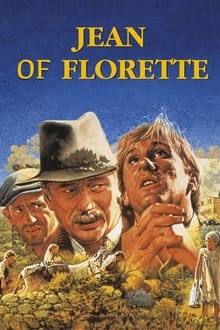
"Ugolin" (Daniel Auteuil) returns from the war to his wealthy uncle "Papet" (Yves Montant) with some inspiration. He doesn't divulge his cunning plan until he is ready, and then presents the man with some perfectly cultivated carnations. It turns out there's money in flowers, but they also need a great deal of water. Gallons and gallons of the stuff. It occurs to "Papet" that their curmudgeonly neighbour might be willing to sell his land, upon which there is a clogged-up spring. No such luck there but an accident shortly afterwards fills them with hope. Sadly for them, their plans are further frustrated by the arrival of the hunch-backed and enthusiastic city boy "Jean" (Gérard Depardieu) and his wife and child who move onto the farm. They are decent and hard-working relatives of the dead man and are determined to use science to make a go of things. Whilst feigning friendship with the family, "Ugolin" and "Papet" cement over their water supply and leave them at the mercy of the unpredictable weather and a rather ropey cistern system. Their farming days would appear to be doomed unless God intervenes. What now ensues sees the family "Cadoret" increasingly struggle to make money breeding rabbits and growing fruit and vegetables - amidst the mother of all heatwaves, as their cognisant neighbours look on unwilling to point out that their salvation is buried but yards away. Will the cynical ploy of the "Soubeyran" clan prevail? There's a great cast doing the work here, with Auteuil especially effective as the slightly conflicted nephew who doesn't always come across as the full shilling; Montand as the calculating, dynastically motivated, manipulator and finally a great effort from Depardieu who manages to portray a man plumbing the depths of despair - whilst always seemingly open to a degree of optimism and hope, really compellingly. The drama is peppered with loads of earthy humour and the small town setting provides for many of the usual characterisations of village life that is sceptical of, if not downright hostile to, new arrivals. It's also quite a potent look at just how crucial running water is, too. It continues through into "Manon de Source"...